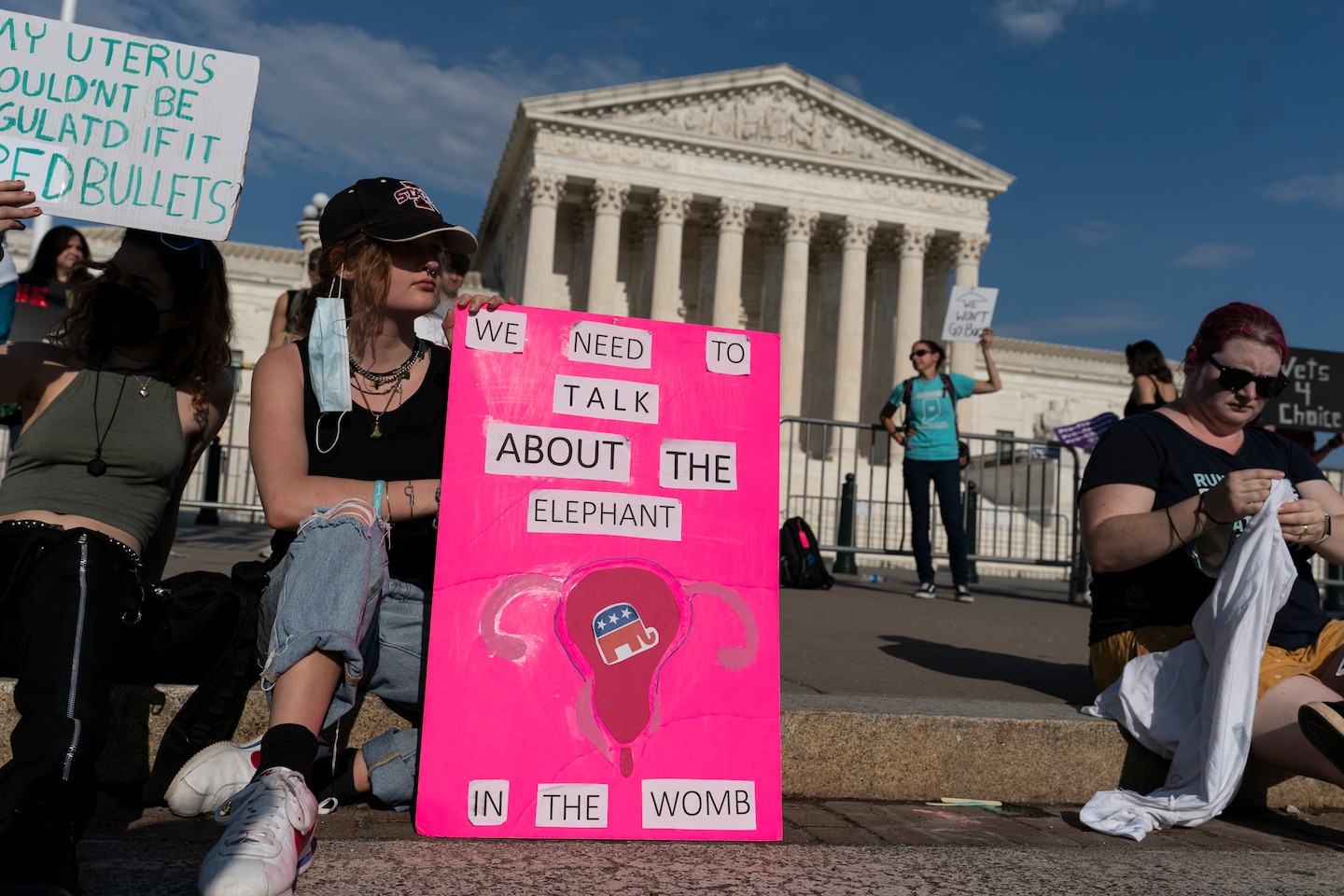Washington is old. That’s true literally (at least in the American context): The city celebrates its 232nd birthday this year. But it’s also true in the metaphorical “Washington, the seat of American power” sense. President Biden is 79, the average age in the House is 58, the average age in the Senate is 64 and the members of the Supreme Court land at an average age of 61. If someone tells you 61 isn’t old, that is because they have already turned or will soon turn 61.
Politics
One important factor in abortion politics: Age – The Washington Post

This is interesting to consider in the moment, given what the court appears to be poised to do. At some point in the next few months, it is expected that a majority of the court’s justices will vote to overturn Roe v. Wade and, with that decision, allow states to ban the practice of abortion. It is a decision that is unusual in that its affects are disproportionately weighted by age: Women who are in the age range where pregnancy is possible are more directly (though certainly not exclusively) affected than young men in the same age range or other older Americans.
It is, in other words, an older generation telling a younger generation what it can do. It’s a tension that’s grown increasingly familiar as the number of millennials reaches and surpasses the number of baby boomers in the population — but it’s a tension that, on this occasion, has very immediate and significant personal repercussions.
Based solely on physiology, we would not be surprised to see a divide on views of abortion by age. And we do. Polling released this week from The Washington Post and our partners at ABC News is matched by polling from Pew Research Center released Friday: Younger Americans are more likely to say abortion should be legal in most or all cases.
In the Post-ABC polling, those under 40 were 10 points more likely than those 65 and up to say abortion should always be legal. In Pew’s polling, the younger segment of that group, those under 30, were 16 points more likely to hold that position than those 65 and over. The Pew data also shows that younger Americans are much less likely than the oldest to say abortion should be illegal, something not similarly reflected in the Post-ABC polling.
This is not solely about the ability to get pregnant, of course. These views are confounded with partisanship: Democrats are much more likely than Republicans to say that abortion should be broadly legal, and young people are much more likely to be Democrats than Republicans.
Using data from the biennial General Social Survey (GSS), we can track views by generation over time. (Here, we’re using Pew’s own generational boundaries.) This is informative because it allows us to see how age groups have changed over time — were baby boomers more supportive of abortion when they were younger? — and to compare generations at the same point in time.
Here are the GSS results for two questions, one about maintaining the legality of abortion in the event that the pregnant individual’s health is at risk and the other about maintaining its legality regardless of reason.
Notice first that baby boomers, Generation X and millennials all have seen increasing support for keeping abortion legal for any reason over the past two decades. For millennials, the increase is stark. Among boomers and Gen X, though, there has also been a decline in the percentage saying they want to maintain the legality of abortion in case the pregnant person’s health is at risk. This is in part because those generational groups are more likely to be Republican and Republican support for this position has declined.
The thin dotted lines show views of baby boomers and Gen X when they were as old as millennials are now. On the question of abortion in the event of a health risk, there’s not much difference. On the question of abortion being available no matter the reason, millennials are far more supportive now than prior generations were at the same age. In other words, this is about a change in views over time, not solely about age.
Consider what this means over the long term. Older conservative decision-makers are acting in opposition to a view held by most younger Americans. After the 2012 election, the Republican Party explored a strategy of trying to appeal to the more diverse group of younger Americans that had twice voted for Barack Obama. Then Donald Trump came along and demonstrated a route to power by mobilizing older White Americans. But it’s an open question of how long that will last or if the party can both continue to appeal to that group and expand its outreach to other voters. If the goal is to appeal to younger voters with an eye toward the future, this decision seems unlikely to help.
Both the left and right will argue their position on moral, not political, grounds. But the political pattern is familiar: old cemented power demanding that younger Americans accede to their will.
Politics
Youri Chassin quits CAQ to sit as Independent, second member to leave this month

Quebec legislature member Youri Chassin has announced he’s leaving the Coalition Avenir Québec government to sit as an Independent.
He announced the decision shortly after writing an open letter criticizing Premier François Legault’s government for abandoning its principles of smaller government.
In the letter published in Le Journal de Montréal and Le Journal de Québec, Chassin accused the party of falling back on what he called the old formula of throwing money at problems instead of looking to do things differently.
Chassin says public services are more fragile than ever, despite rising spending that pushed the province to a record $11-billion deficit projected in the last budget.
He is the second CAQ member to leave the party in a little more than one week, after economy and energy minister Pierre Fitzgibbon announced Sept. 4 he would leave because he lost motivation to do his job.
Chassin says he has no intention of joining another party and will instead sit as an Independent until the end of his term.
He has represented the Saint-Jérôme riding since the CAQ rose to power in 2018, but has not served in cabinet.
This report by The Canadian Press was first published Sept. 12, 2024.
The Canadian Press. All rights reserved.
Politics
‘I’m not going to listen to you’: Singh responds to Poilievre’s vote challenge

MONTREAL – NDP Leader Jagmeet Singh says he will not be taking advice from Pierre Poilievre after the Conservative leader challenged him to bring down government.
“I say directly to Pierre Poilievre: I’m not going to listen to you,” said Singh on Wednesday, accusing Poilievre of wanting to take away dental-care coverage from Canadians, among other things.
“I’m not going to listen to your advice. You want to destroy people’s lives, I want to build up a brighter future.”
Earlier in the day, Poilievre challenged Singh to commit to voting non-confidence in the government, saying his party will force a vote in the House of Commons “at the earliest possibly opportunity.”
“I’m asking Jagmeet Singh and the NDP to commit unequivocally before Monday’s byelections: will they vote non-confidence to bring down the costly coalition and trigger a carbon tax election, or will Jagmeet Singh sell out Canadians again?” Poilievre said.
“It’s put up or shut up time for the NDP.”
While Singh rejected the idea he would ever listen to Poilievre, he did not say how the NDP would vote on a non-confidence motion.
“I’ve said on any vote, we’re going to look at the vote and we’ll make our decision. I’m not going to say our decision ahead of time,” he said.
Singh’s top adviser said on Tuesday the NDP leader is not particularly eager to trigger an election, even as the Conservatives challenge him to do just that.
Anne McGrath, Singh’s principal secretary, says there will be more volatility in Parliament and the odds of an early election have risen.
“I don’t think he is anxious to launch one, or chomping at the bit to have one, but it can happen,” she said in an interview.
New Democrat MPs are in a second day of meetings in Montreal as they nail down a plan for how to navigate the minority Parliament this fall.
The caucus retreat comes one week after Singh announced the party has left the supply-and-confidence agreement with the governing Liberals.
It’s also taking place in the very city where New Democrats are hoping to pick up a seat on Monday, when voters go to the polls in Montreal’s LaSalle—Émard—Verdun. A second byelection is being held that day in the Winnipeg riding of Elmwood—Transcona, where the NDP is hoping to hold onto a seat the Conservatives are also vying for.
While New Democrats are seeking to distance themselves from the Liberals, they don’t appear ready to trigger a general election.
Singh signalled on Tuesday that he will have more to say Wednesday about the party’s strategy for the upcoming sitting.
He is hoping to convince Canadians that his party can defeat the federal Conservatives, who have been riding high in the polls over the last year.
Singh has attacked Poilievre as someone who would bring back Harper-style cuts to programs that Canadians rely on, including the national dental-care program that was part of the supply-and-confidence agreement.
The Canadian Press has asked Poilievre’s office whether the Conservative leader intends to keep the program in place, if he forms government after the next election.
With the return of Parliament just days away, the NDP is also keeping in mind how other parties will look to capitalize on the new makeup of the House of Commons.
The Bloc Québécois has already indicated that it’s written up a list of demands for the Liberals in exchange for support on votes.
The next federal election must take place by October 2025 at the latest.
This report by The Canadian Press was first published Sept. 11, 2024.
The Canadian Press. All rights reserved.
Politics
Social media comments blocked: Montreal mayor says she won’t accept vulgar slurs

Montreal Mayor Valérie Plante is defending her decision to turn off comments on her social media accounts — with an announcement on social media.
She posted screenshots to X this morning of vulgar names she’s been called on the platform, and says comments on her posts for months have been dominated by insults, to the point that she decided to block them.
Montreal’s Opposition leader and the Canadian Civil Liberties Association have criticized Plante for limiting freedom of expression by restricting comments on her X and Instagram accounts.
They say elected officials who use social media should be willing to hear from constituents on those platforms.
However, Plante says some people may believe there is a fundamental right to call someone offensive names and to normalize violence online, but she disagrees.
Her statement on X is closed to comments.
This report by The Canadian Press was first published Sept. 11, 2024.
The Canadian Press. All rights reserved.
-

 Sports16 hours ago
Sports16 hours agoLawyer says Chinese doping case handled ‘reasonably’ but calls WADA’s lack of action “curious”
-

 News15 hours ago
News15 hours agoB.C. to scrap consumer carbon tax if federal government drops legal requirement: Eby
-

 News15 hours ago
News15 hours agoA linebacker at West Virginia State is fatally shot on the eve of a game against his old school
-

 Sports23 hours ago
Sports23 hours agoCanada’s Michael Woods rethinks retirement, targets Montreal win after Vuelta triumph
-

 News15 hours ago
News15 hours agoHall of Famer Joe Schmidt, who helped Detroit Lions win 2 NFL titles, dies at 92
-

 News16 hours ago
News16 hours agoShapovalov, Auger-Aliassime lift Canada over Finland 3-0 in Davis Cup tie
-

 News16 hours ago
News16 hours agoOttawa loses bid to quash Israel advocates’ lawsuit calling for halt to UNRWA funding
-

 News16 hours ago
News16 hours agoCeiling high for Vancouver Whitecaps midfielder Ahmed: Canada coach































